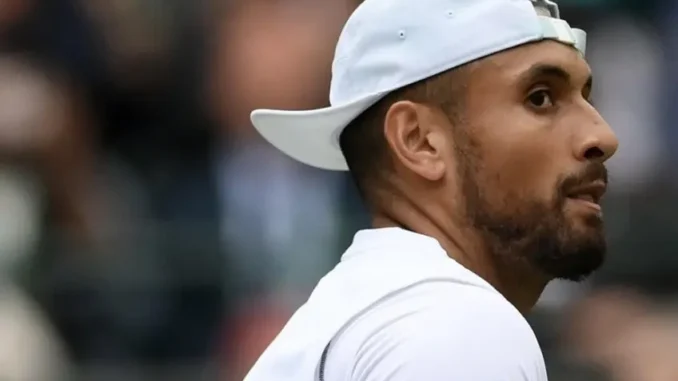
The 2025 Wimbledon Championships have ushered in a seismic shift, abandoning a 148-year tradition of human line judges in favor of electronic line-calling technology. This bold move, aligning Wimbledon with other Grand Slams like the US Open and Australian Open, has sparked debate among players, fans, and pundits. Among the most vocal critics is Australian tennis maverick Nick Kyrgios, who, despite being sidelined by injury, has taken to the airwaves to express his dismay. Speaking on talkSPORT’s *Wimbledon Unfiltered*, the 2022 Wimbledon finalist argued passionately that the All England Club should preserve its storied traditions, lamenting the loss of a unique element that he believes defines the tournament’s soul.
Kyrgios, known for his fiery personality and unfiltered opinions, didn’t hold back when asked about the decision to replace the 300 line judges with Hawk-Eye’s advanced system, which uses 18 cameras per court to track the ball’s trajectory with pinpoint accuracy. “I will, I will,” he said when questioned about whether he’d miss the human element, his tone tinged with nostalgia. “I actually had a conversation about this yesterday. I think Wimbledon should never change any rule. It should be the only tournament that holds every tradition that ever started in tennis.” For Kyrgios, the charm of Wimbledon lies in its steadfast adherence to history—from the all-white dress code to the meticulously maintained grass courts. The removal of line judges, a fixture since the tournament’s inception in 1877, feels like a betrayal of that legacy.
The decision to adopt electronic line-calling comes after years of debate and a successful trial at the 2024 Championships. The technology, already standard in other majors, eliminates human error and speeds up disputed calls, offering players immediate clarity. Yet, Kyrgios sees it differently. “It’s been 148 years with human line calls,” he noted. “I think they could have got to 150 and done a big anniversary challenge.” His sentiment reflects a broader concern among traditionalists that Wimbledon risks losing its distinct identity by aligning with modern trends. “Personally, I think it would have been cool to have traditions of tennis never change at Wimbledon,” he added, underscoring his belief that the tournament should remain a bastion of the sport’s heritage.
Kyrgios’s critique is particularly poignant given his deep connection to Wimbledon. His breakout moment came in 2014 when, as a 19-year-old wildcard ranked No. 144, he stunned Rafael Nadal in the fourth round, showcasing his audacious talent on the grass. In 2022, he reached the men’s singles final, pushing Novak Djokovic in a thrilling four-set battle. Those experiences, coupled with his love for the tournament’s aura, fuel his passionate defense of its traditions. “Wimbledon holds special memories for me,” he said recently. “It’s the pinnacle of tennis. Every time you step into the grounds, you feel the energy and the aura.” Yet, he admitted to feeling like “a snowman in the desert” at times, given his unconventional style in a sport steeped in propriety.
The Australian’s absence from the 2025 Championships, due to a recurring knee injury, hasn’t dimmed his influence. Sidelined since his last competitive match at the 2023 Stuttgart Open, Kyrgios has shifted to media roles, including his new gig with talkSPORT and his *Good Trouble* podcast, where he’s hosted luminaries like Djokovic and Naomi Osaka. His commentary, often laced with sharp insights and irreverent humor, has made him a polarizing yet compelling voice. “I’ve had my fun times arguing with umpires, and now you won’t get that!” he quipped, hinting at the spirited exchanges that human line judges often sparked, a dynamic now lost to automated precision.
Kyrgios isn’t alone in his reservations. World No. 1 Aryna Sabalenka also expressed a preference for the traditional setup, noting, “I feel like Wimbledon always been like with the line umpires and kind of like historically you see the referees there. Maybe I would prefer that.” However, others, like former British No. 1 Tim Henman, have embraced the change, citing the reliability and consistency of electronic systems. The divide reflects a broader tension in tennis between preserving heritage and embracing innovation, with Wimbledon’s decision signaling a shift toward the latter.
For Kyrgios, the issue extends beyond line calls to Wimbledon’s broader identity. He’s long challenged the tournament’s strict rules, notably its all-white dress code, which cost him $16,000 in fines for wearing a red Jordan hat and shoes in 2022. He recently proposed a radical shift to all-black attire, arguing it would create a striking visual contrast on the grass. “It would look super clean on the court and on TV,” he said, though he acknowledged, “Wimbledon doesn’t really care what looks cool.” His push for modernization in some areas, juxtaposed with his defense of line judges, highlights his complex relationship with the tournament—a place where he’s both thrived and clashed with its rigid standards.
As Wimbledon 2025 unfolds, the absence of line judges has already altered the tournament’s atmosphere, with fans and players adjusting to the seamless but impersonal calls of Hawk-Eye. For Kyrgios, watching from the commentary booth, the change is a bittersweet reminder of a sport evolving faster than he’d like. “The tennis world’s not going to listen to me,” he said with a wry smile, yet his voice continues to resonate, challenging conventions and championing the traditions that make Wimbledon unique. As he works toward a comeback for the US Open, Kyrgios remains a disruptor, urging the sport to balance progress with the timeless allure that drew him—and millions of fans—to the grass courts of SW19.
Leave a Reply